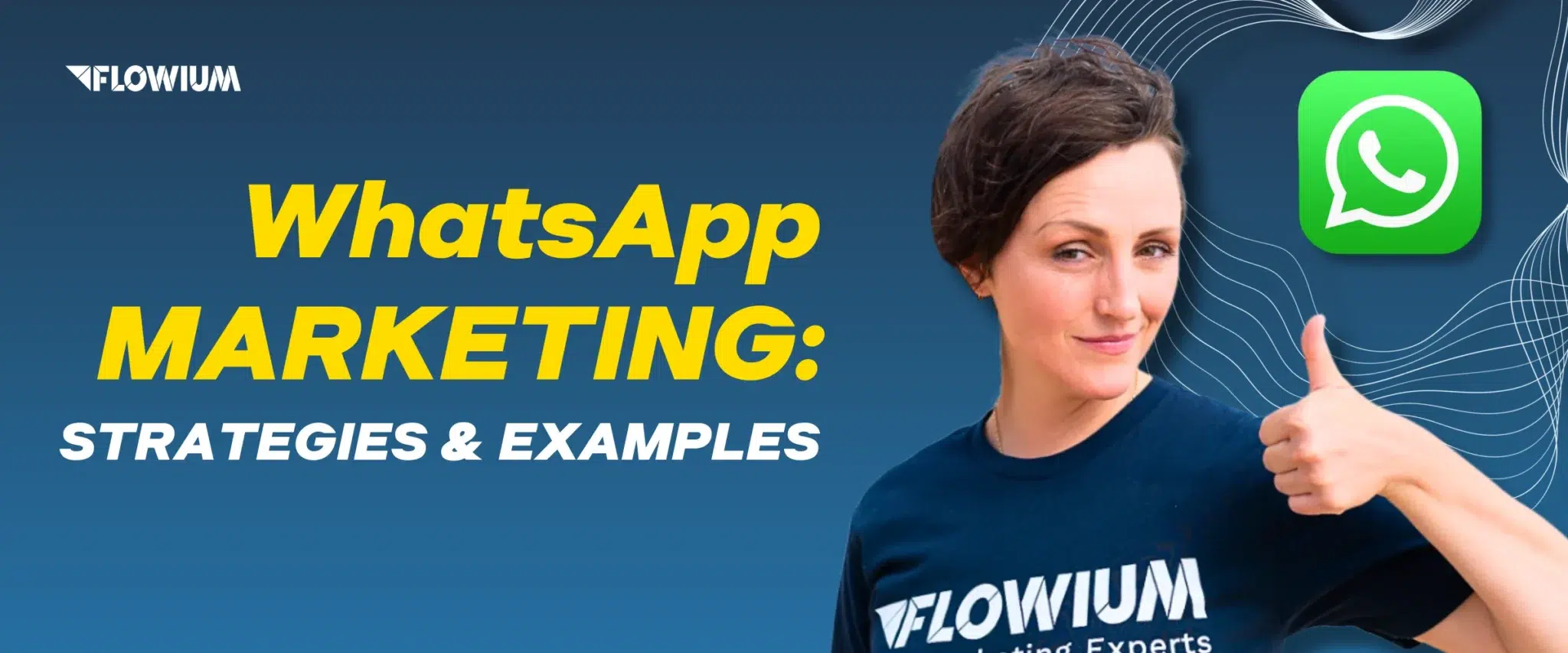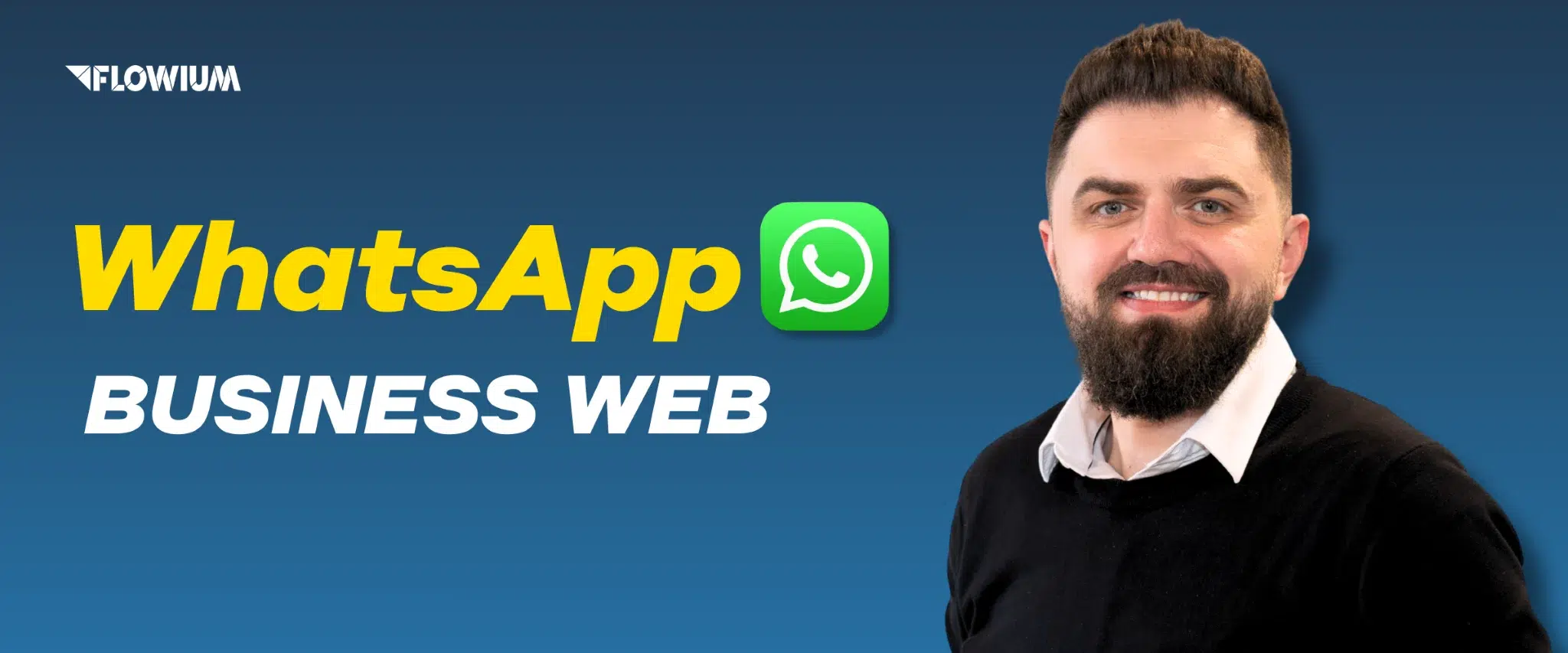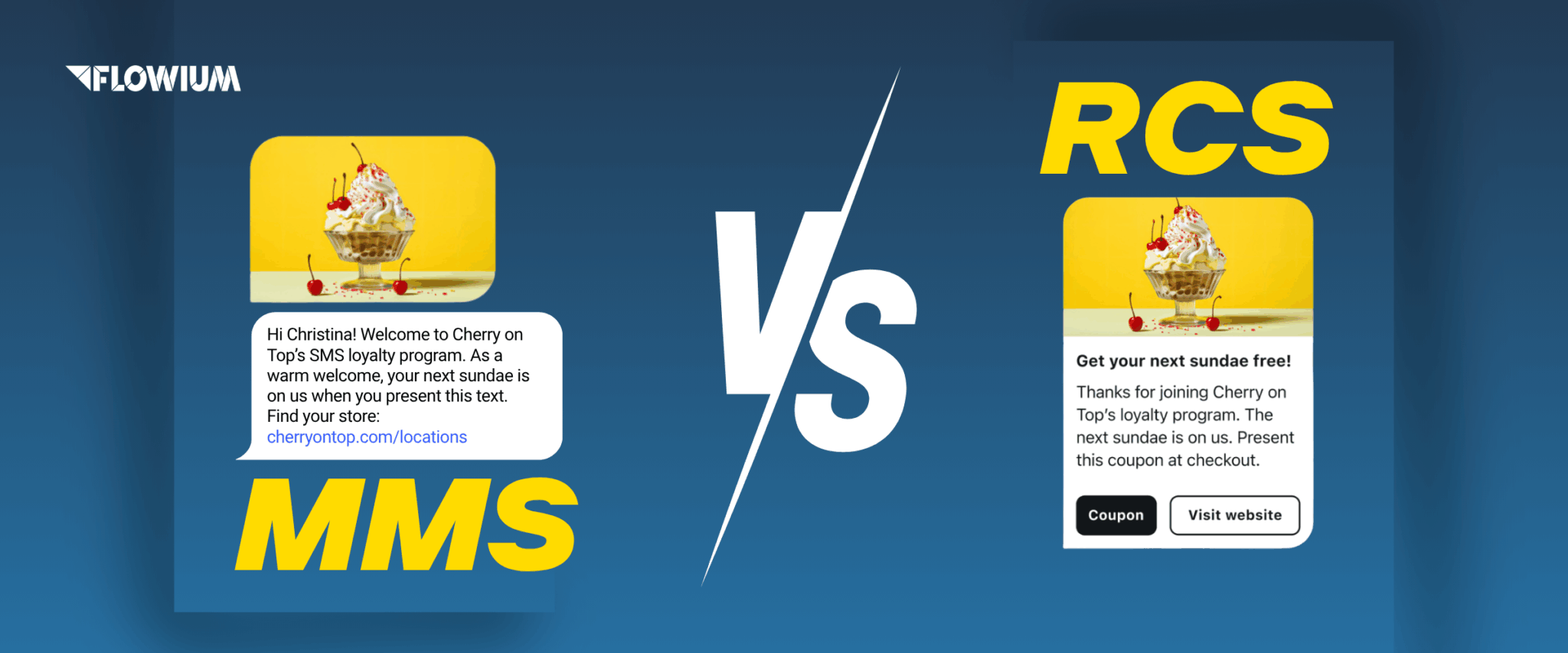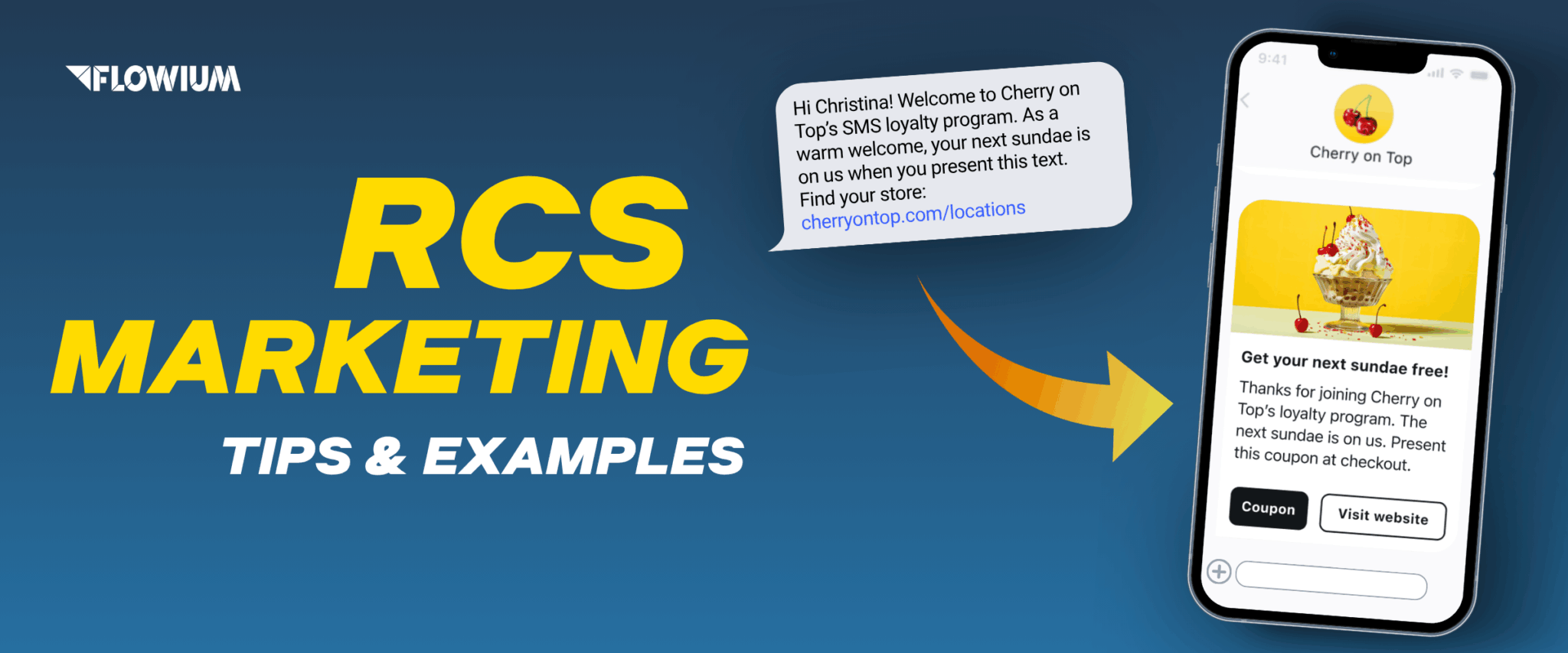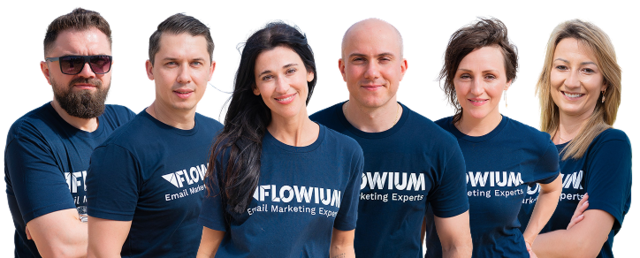Current trends in marketing call for implementing omnichannel strategies to maximize the outreach and enhance the performance of your business promotions. While email services are considered one of the leading means for digital promotions, their combination with text message marketing is gaining more popularity due to increased efficiency. This is especially relevant for sending promotional messages through popular apps like WhatsApp. However, messaging your clients on this app like you message your peers won’t work for brands. To bring results in the form of sales and revenue, you need special campaigns to be put in place that focus on suitable product promotion strategies, client retention, and correct business communication.
In this article, we’ll explore the major points of WhatsApp marketing, analyze best practices, and look into some of the successful campaign examples.
What is WhatsApp Marketing?
Fundamentally, WhatsApp marketing involves using WhatsApp strategically to inform, engage, and convert users with customized messages. This strategy, in contrast to conventional marketing techniques, is based on two-way communication, enabling companies to engage in genuine conversations rather than merely promoting products.
You can create campaigns that generate genuine engagement and outcomes using tools like chatbots, multimedia messages, product catalogs, and interactive buttons.
Who Should Use Marketing Through WhatsApp
WhatsApp marketing is a powerful tool for businesses to connect with customers in a personalized and timely manner. Here’s a look at how different industries can leverage its features to improve engagement and streamline operations.
- Retail and Ecommerce
Boost sales and customer loyalty by using WhatsApp to offer exclusive discounts and customized promotions tailored to individual shopping habits. Reduce cart abandonment by sending timely reminders to customers who leave items in their virtual baskets. Take advantage of WhatsApp marketing to allow customers to browse products and complete purchases directly within the chat, creating a seamless, in-thread shopping experience.
- Financial Services
Keep customers informed and secure with automated updates. Send critical account updates, immediate fraud alerts, and real-time transaction notifications to give customers peace of mind and control over their finances.
- Media and Entertainment
Increase engagement and retention by sending personalized content and reminders. Use WhatsApp to send subscription renewal notifications, event reminders, and personalized content recommendations. Use interactive list messaging to ask customers about their preferences, allowing them to easily select what content they want to see next.
- QSR & On-Demand Services
Automate key customer communications to improve efficiency and satisfaction. Send order confirmations, provide real-time delivery tracking, and automatically distribute loyalty rewards to keep customers coming back.
- Travel and Hospitality
Enhance the travel experience with personalized communication. Deliver customized offers, provide timely flight updates, and send instant reservation confirmations. Use WhatsApp Flows to simplify the booking process, guiding customers step-by-step through making or modifying their reservations directly within the app.
Benefits of WhatsApp Marketing
As you can see, businesses in different segments can significantly boost engagement and sales by leveraging unique capabilities for marketing on WhatsApp.
If we look into statistics, YCloud provides a report that this app serves 50 million businesses worldwide for sales, marketing, and support. WhatsApp is the preferred method for 54% of users to receive order confirmations and marketing information. It is currently the favorite customer service method for 39% of customers. 72% of users say they are more inclined to engage with customized messaging.
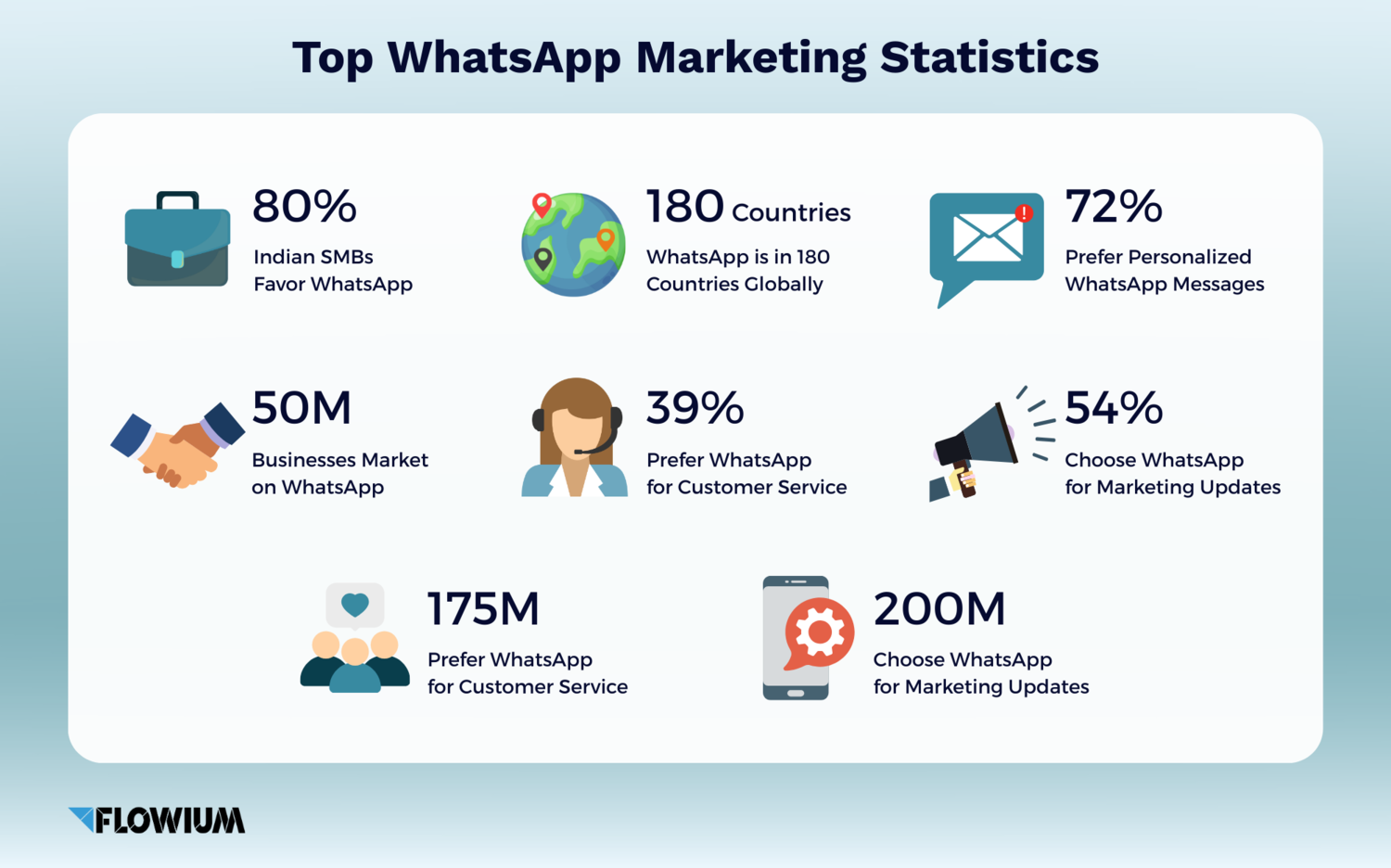
Here are more key advantages of integrating WhatsApp into your advertising strategy:
- Engagement
WhatsApp is a highly popular messaging platform with over 100 billion messages sent daily. Unlike emails that get lost in crowded inboxes, 80% of WhatsApp messages are opened within the first five minutes, ensuring your messages are seen immediately.
- Boosted Conversions
WhatsApp has a much higher conversion rate than some of the traditional marketing channels. This means your marketing efforts will generate more leads and sales.
- Cost-Effective Marketing
Traditional advertising and SMS marketing can be expensive. In contrast, WhatsApp provides an affordable way to reach a highly engaged audience, making it an excellent option for businesses looking to maximize their marketing budget.
- Personalized Experiences
Personalized marketing is the key strategy nowadays, and WhatsApp delivers all the capabilities for it. You can provide real-time help, offer tailored product recommendations, and customize messages based on user behavior, which can increase sales by up to 40%.
- Real-time Customer Support
WhatsApp enables direct, real-time communication with customers. You can quickly answer questions, resolve issues, and provide instant support, leading to higher customer satisfaction and loyalty.
- Global Reach
Available in over 180 countries and 60+ languages, WhatsApp allows you to connect with customers worldwide instantly. You can send messages at a fraction of the cost of international SMS fees, effectively breaking down geographical barriers.
How to Use WhatsApp for Marketing
1. Make a business account on WhatsApp
Choose between the WhatsApp Business App (for small businesses) or the WhatsApp Business API (for larger operations). Apply for the green tick verification by submitting business registration documents, proof of address, and your company logo. Verification takes about 2-3 weeks, so start early.
2. Choose the right WhatsApp marketing software
Select a WhatsApp BSP that fits your needs. Look for seamless integration, reliable broadcast capabilities, detailed analytics, and template management. Your choice should align with budget, technical expertise, and marketing goals. We recommend Klaviyo as it offers a smooth integration and a wide range of marketing and analytics features specifically for ecommerce.
3. Encourage Customer Signups
WhatsApp sends marketing messages only after receiving permission. Use your website, landing page, phone number capture form, or social media connections to promote your WhatsApp channel and encourage opt-ins. Be transparent about message frequency and content. After signing up, send automated welcome messages and keep documentation of all signups to remain compliant.
4. Segment Audience and Personalize Messages
Avoid generic blasts-segment customers by purchase history, location, engagement, or interests. Personalize beyond first names by referencing products they viewed or purchased. Start with 2–3 segments and expand as data grows.
5. Set up WhatsApp Marketing Automation
Automation saves time and keeps customers engaged. Essential workflows include welcome messages, abandoned cart reminders, order and shipping updates, post-purchase follow-ups, and re-engagement campaigns. All flows require pre-approved templates, which typically take 1-3 business days for approval.
6. Track Performance & Optimize
Monitor important indicators such as conversions, click-through rates, and read rates. To increase engagement, A/B test message designs, offers, timing, and CTA placements. Calculate ROI by comparing campaign costs against revenue to continuously refine your WhatsApp strategy.
WhatsApp Marketing Use Cases for Businesses
Sending Promotional Campaigns
Brands use WhatsApp to advertise new items, share special deals, and highlight seasonal sales as part of their marketing campaigns. Similar to Instagram Stories, WhatsApp Status can display temporary promotions or product drops that end after a day. Click-to-WhatsApp advertisements on Facebook or Instagram are another effective tactic. Businesses may add prospects to a broadcast list and have quick access to their contact information when users click on these ads, which instantly open a chat window in WhatsApp.
Sending Product Launch and Teaser Campaigns
Encourage customers to talk about you and share your offers by using WhatsApp for client interaction. By introducing your contacts to your products ahead of time, allowing them to observe your product in use, and providing them with special discounts via WhatsApp promotional campaigns, you may build excitement around your product launches.
By providing hints, initiating countdowns, and distributing information through teaser campaigns, you can entice your clients.
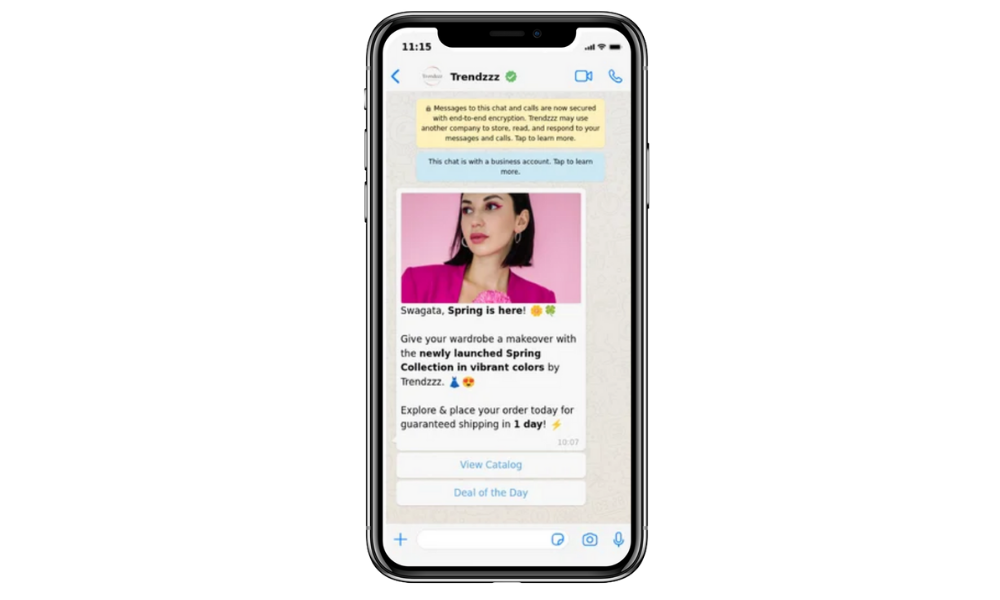
Providing Automated Updates
When it comes to sending automated updates like order confirmations, delivery information, and reminders, WhatsApp works incredibly well. Chatbots are a useful tool for businesses to welcome new clients and point them toward pertinent information. In order to provide an instant feeling of exclusivity, these initial encounters can also offer extra value, like as discount vouchers, freebies, or first access to exclusive product launches.
Making In-App Catalogs
Using catalogs that display items, prices, and descriptions, turn WhatsApp into a miniature ecommerce site. To satisfy customers’ desire for convenience, enable immediate transactions via WhatsApp Payments and streamline the checkout process.
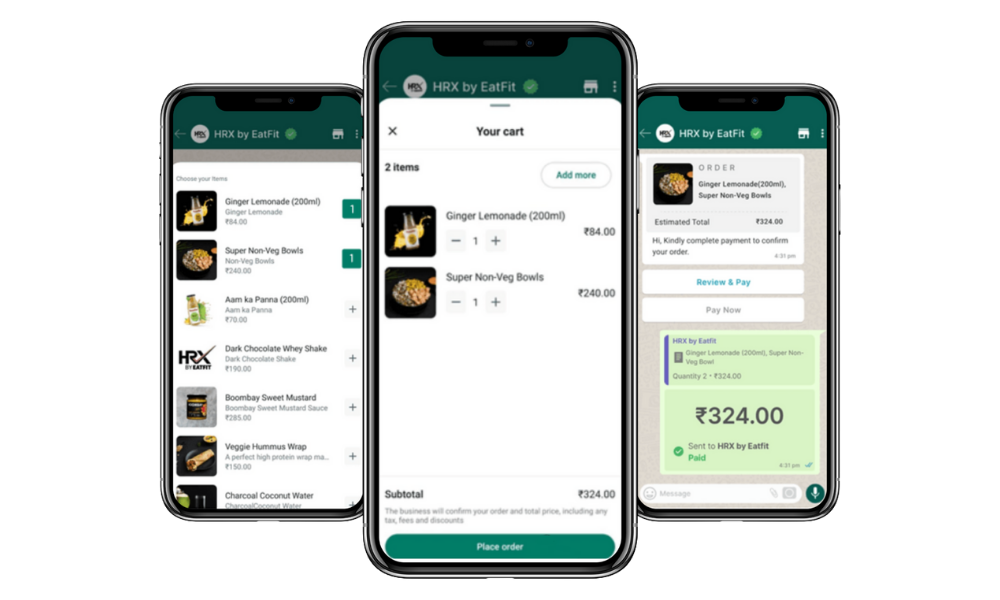
Taking Care of Lead Nurturing
Businesses may also use the app to nurture leads by guiding prospects through the purchasing process, making tailored recommendations, and instantly responding to questions. Marketers may gradually turn infrequent users into paying customers by consistently delivering valuable content and tailored offers.
Personalized Messaging
Compared to standard text, messages sent via the WhatsApp Business API may be more dynamic. By adding emojis, images, videos, or documents, businesses can increase the recall value of their communications. Using a customer’s name, recognizing their birthday, or providing them with specials based on past interactions are all examples of how personalization can strengthen relationships and foster trust.
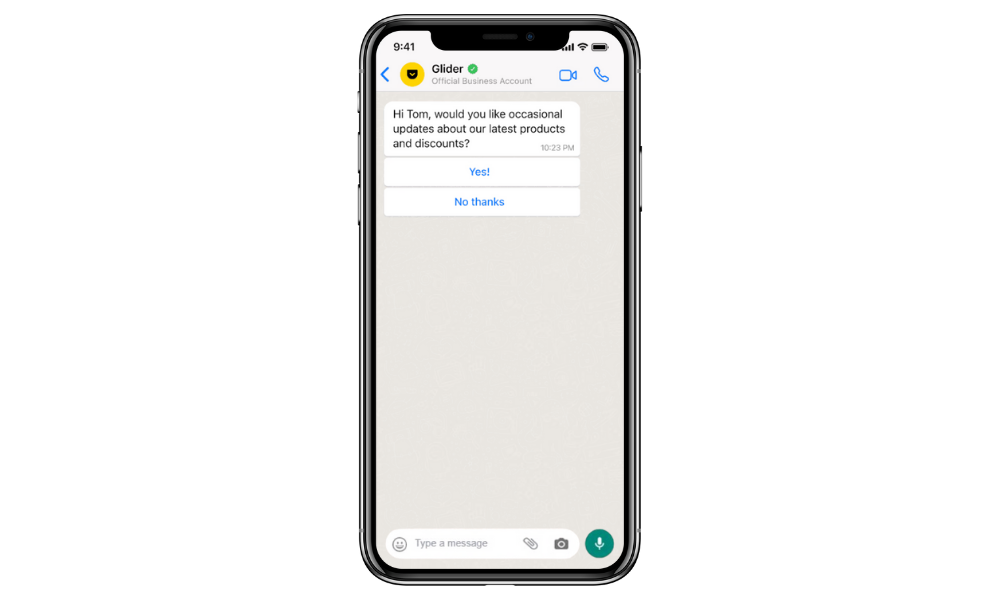
Organizing Customer Service & Support
WhatsApp serves as a round-the-clock customer support avenue. Chatbots can respond to common queries, which make up nearly one-third of all customer complaints. Examples of these queries include order status updates and promotional reminders. Support staff can handle complex problems more effectively because of this technology, while customers get faster responses. 89% of consumers are more likely to make a repeat purchase following a positive customer service encounter, according to research. Increased loyalty and retention are directly correlated with excellent WhatsApp support.
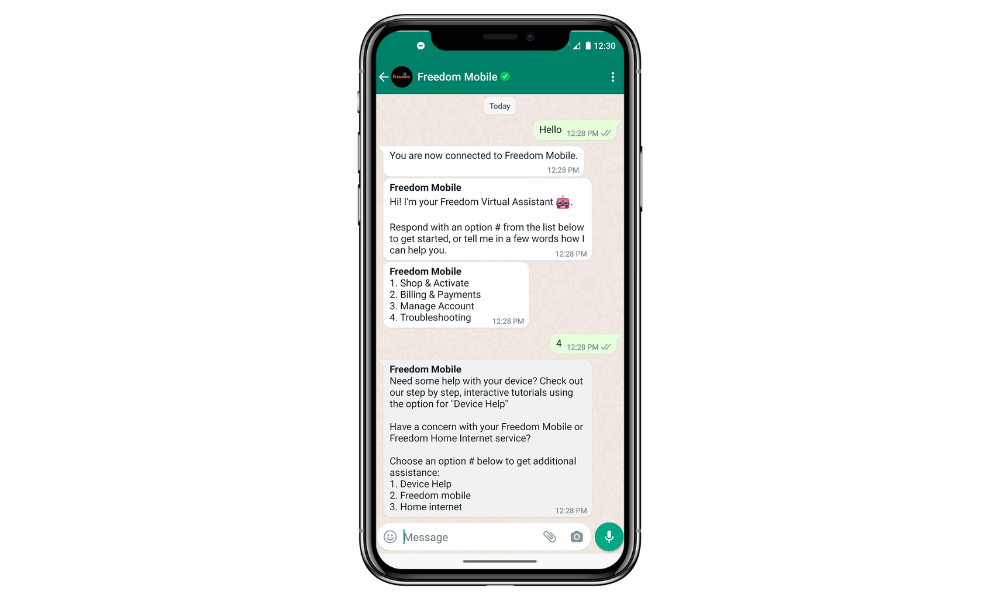
Onboarding
From the first conversation, WhatsApp onboarding initiatives assist new users in becoming familiar with the platform’s offerings. By instructing customers to upload papers straight through WhatsApp or rerouting them to a landing page for secure submission, businesses can automate crucial processes like KYC. Following completion, prompt updates on the KYC status foster confidence and guarantee a seamless onboarding process.
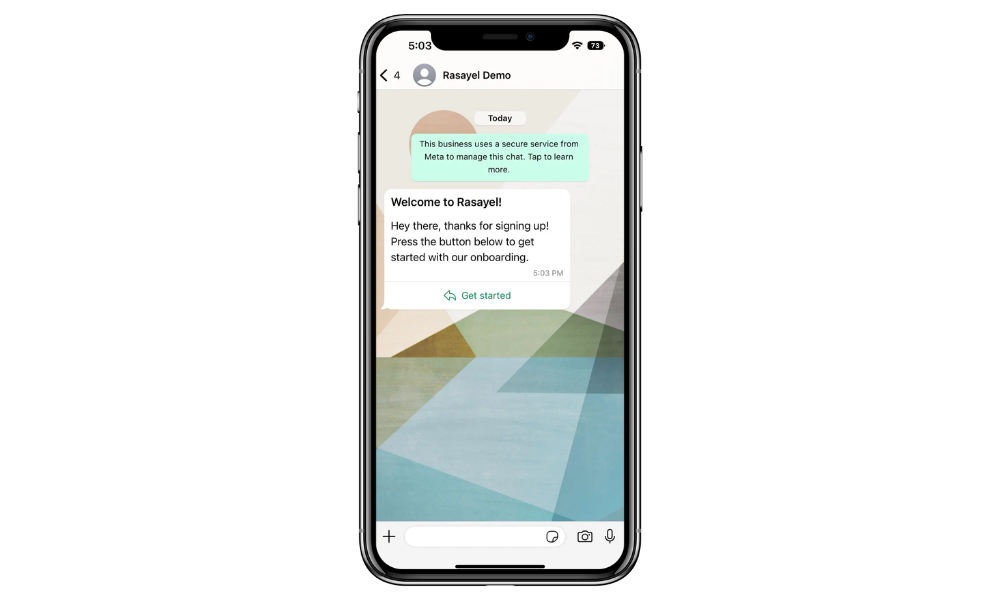
Post-Purchase Messages
WhatsApp post-purchase messages enhance the customer journey by confirming orders and providing shipping updates in real time. They also create opportunities to recommend complementary products based on the customer’s first purchase, making shopping more personalized. This aids in the subsequent stages of the purchasing process in addition to improving your understanding of your clients. By sharing helpful tips, care instructions, or usage guides, brands can improve customer satisfaction and encourage repeat purchases.
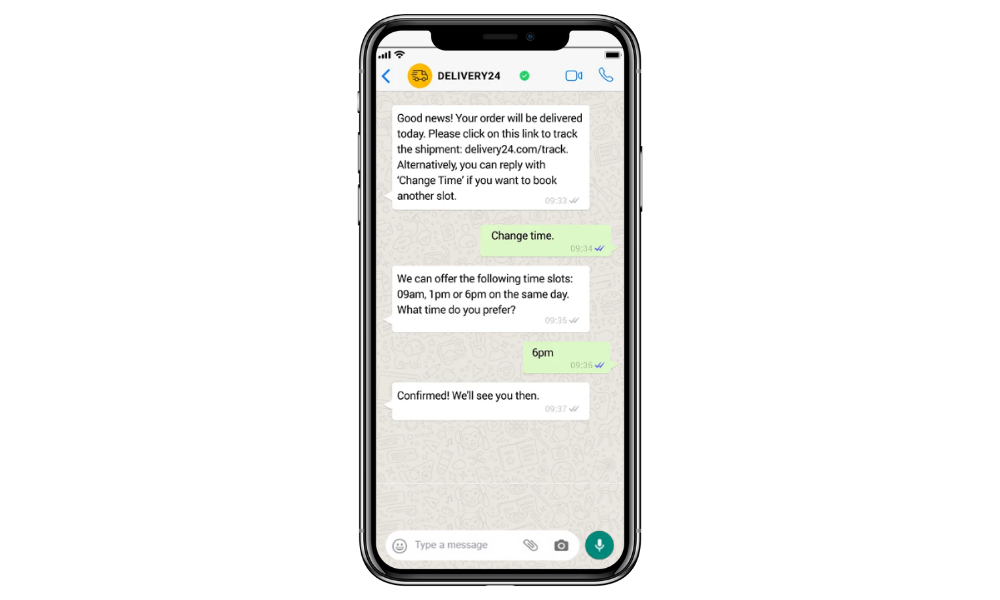
Adoption and Subscription
Nowadays, a lot of consumer apps are subscription-based, particularly those from the D2C sector. Organizations should contact current customers who have left the platform at some point during the customer cycle and encourage adoption using fresh and creative channels to increase conversions. Messaging clients who are routinely using other products but are not aware of your platform is one of the most popular strategies to encourage uptake.
Product Recommendations
You will learn more about your clients’ tastes and be able to further customize messaging as they buy more and more products to meet their wants. This goes beyond simply suggesting products; you should always work to improve and streamline customer experiences. To do this, you must develop a plan that will encourage users to return to your platform and actively interact with your brand. Recall that using WhatsApp marketing to increase sales for repeat business is necessary to raise customer lifetime value (LTV) and ROI.
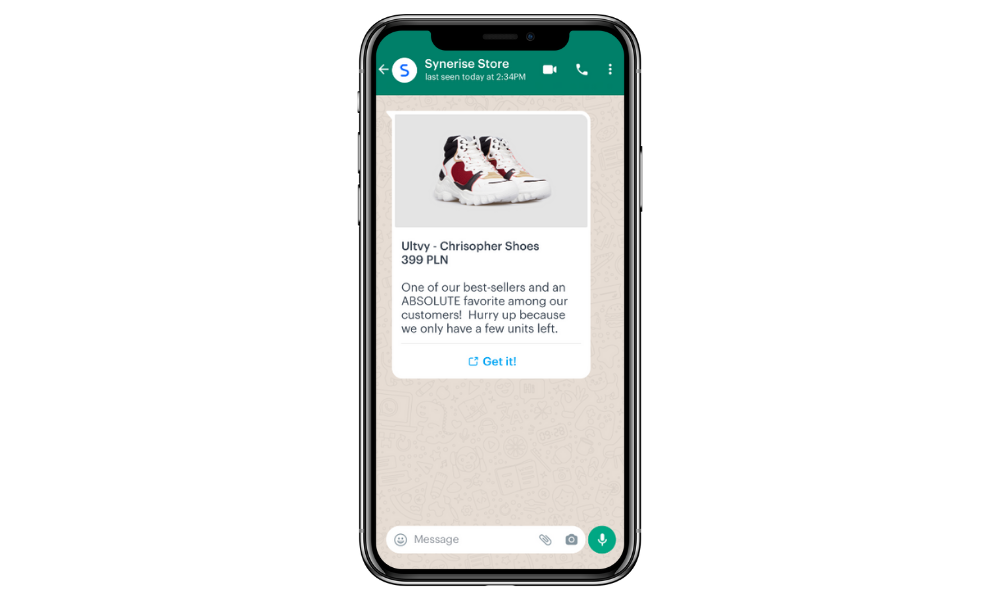
Re-engagement
Re-engagement campaigns allow you to re-engage inactive users by delivering them personal messages, product news, or offers. Using WhatsApp as a channel, you can spark interest again by offering them incredible discounts on repurchases, guide them directly to the landing page, and occasionally send them suitable products.
How to Set Up WhatsApp Marketing Automation
You can use your WhatsApp Business app or your WhatsApp Business API to set up WhatsApp automation, depending on the size of your company.
For small enterprises communicating with clients, the WhatsApp Business app is especially helpful. It provides a number of features designed especially to meet small business demands.
Here are some tasks that can be automated with the WhatsApp Business App:
- Welcome messages
- Personalized schedule notifications
- Broadcast Messages
- Quick replies
The WhatsApp Business App is useful for automating simple responses, but it has certain restrictions. The WhatsApp Business API is the next rational step if you want to build chatbots, send bulk messages, scale real-time discussions, or integrate WhatsApp with your CRM.
To establish advanced WhatsApp automations with maximum efficiency, you need to use one of the popular automation tools. Here’s a short list of services we recommend using, as they provide a smooth connection with your CRM and have a straightforward setup:
- Klaviyo
- Zapier
- WATI
- Brevo (formerly Sendinblue)
- Chatfuel
- Infobip
- Growby
WhatsApp Marketing Best Practices
- Make each message valuable
Ensure that every message is timely, pertinent, and interesting. Share special offers, first dibs, or tailored suggestions; don’t simply sell; educate, amuse, or find a solution.
- Employ carousel messaging to enhance narrative quality
Use WhatsApp’s carousel structure to showcase several features or goods at once. These cards boost interaction and direct users to purchase pages, making them perfect for launches, promotions, or abandoned basket alerts.
- Use FOMO to increase engagement
Flash promotions, early bird discounts, and urgency statements can all help customers make snap judgments. Passive readers become active customers because of this sense of urgency.
- Create WhatsApp communities
By providing early access, behind-the-scenes content, and insider updates, VIP groups may foster loyalty. Encourage conversations and exchanges that build a brand experience that is driven by the community.
- Time your messages correctly
Adapt messages to the time zones and behavior of your customers. To increase engagement, experiment with varied send times; but, to minimize opt-outs, stay away from extremes like early mornings or late nights.
Common WhatsApp Business Marketing Mistakes
- Disregarding the messaging guidelines
WhatsApp has stringent anti-spam guidelines. Always get clear consent, offer simple means to opt out, and go by WhatsApp Business guidelines. Noncompliance may result in lower delivery rates, account suspension, or even legal problems.
- Ignoring the importance of mobile optimization
Your audience is constantly checking their messages. To keep content readable and engaging, use bullet points, keep your writing brief, and make sure your calls to action are tappable with a single click.
- Excessive message sending
Unsubscribe rates are high when clients are overloaded. To make sure each message adds value, limit the number of messages you send each week to two or three, schedule them carefully, and prioritize quality over quantity.
- Not establishing a unique brand voice
Your brand should be reflected in your messages; they shouldn’t seem robotic. To make your messaging memorable and interesting, keep your tone constant, whether it’s lighthearted and humorous or formal and educational.
WhatsApp Marketing Campaign Examples from Real Brands
Promotional Campaign from Kikuu
Any WhatsApp advertising message’s main objective is to grab the user’s attention and motivate them to take action. For this reason, emoticons, exclamations, and vibrant pictures are frequently found in message examples.
In their vibrant WhatsApp advertising messages promoting bargains, online shop KiKUU incorporates rich media, such as graphics and call-to-action buttons. It is simple to navigate the website and make purchases while on the go, thanks to the integrated click-to-store feature.
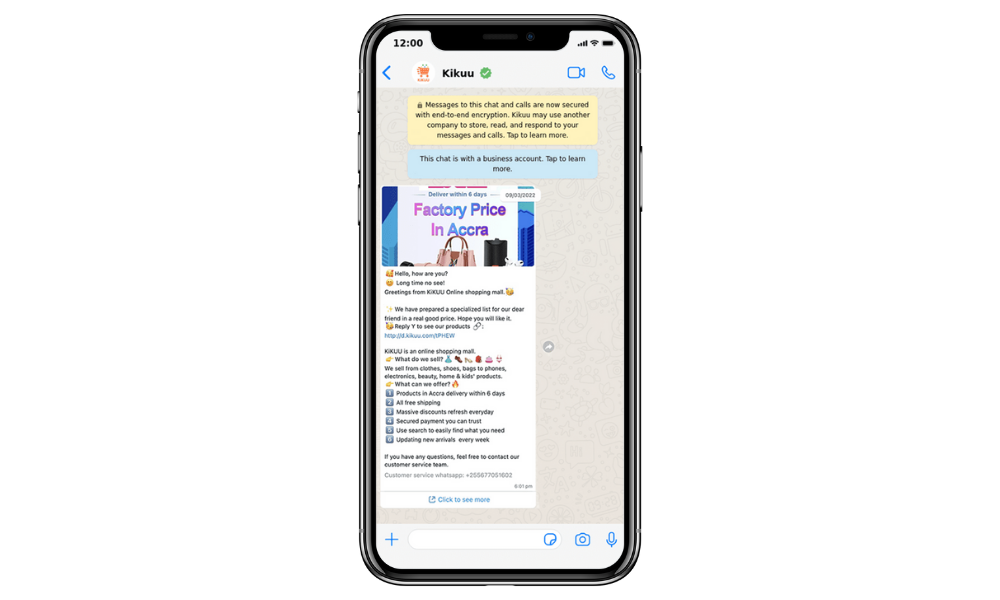
WhatsApp Marketing Chatbot Usage by Nivea
In order to reach customers in their target market with a positive message celebrating diversity, Nivea employs a WhatsApp chatbot to execute a very innovative and effective campaign around their Cocoa Shades range. By establishing a personal connection with each consumer, they increase engagement and skillfully promote their products.
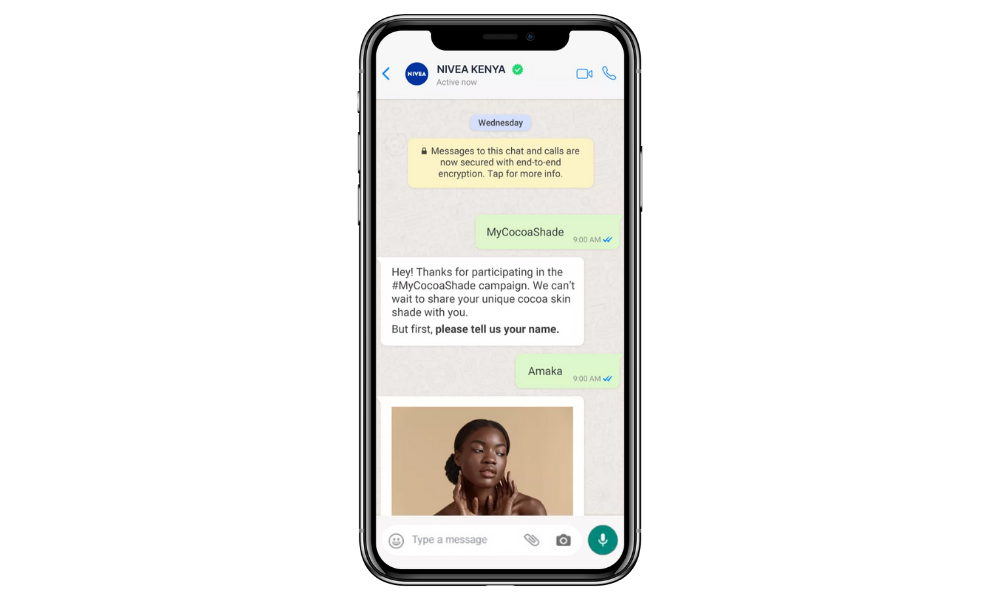
Flash Sale Campaign for Valentine’s Day from Lenskart
Lenskart used targeted advertising messages in an effort to increase Valentine’s Day sales. They started an automated WhatsApp campaign with a “Buy 1 Get 1 Free” deal, as well as 10-day cashback incentives and 14% discounts. To enhance the overall customer experience, they customized messaging and followed up with styling advice and maintenance instructions based on the customer’s browsing history and previous purchases.
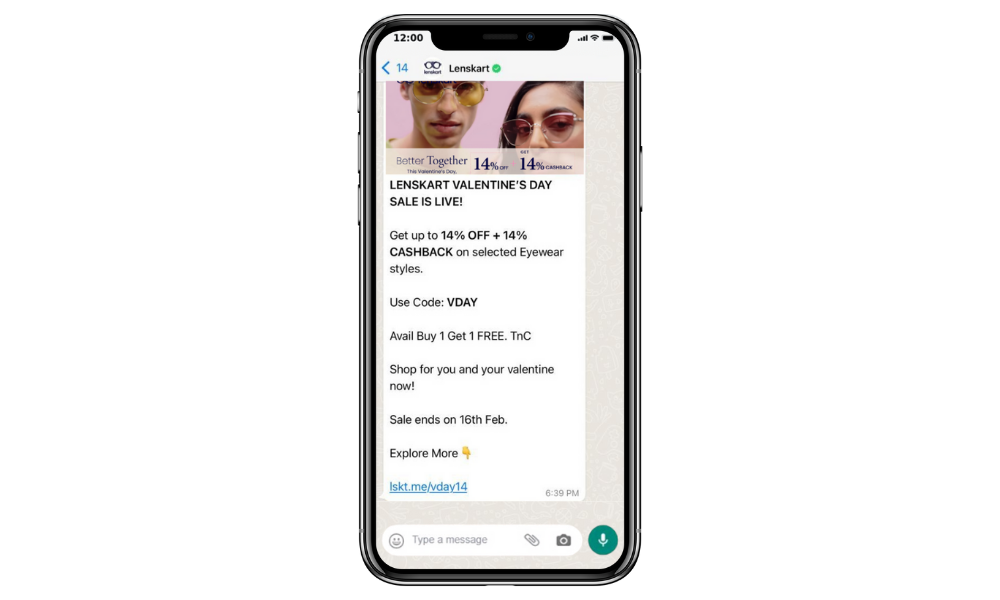
Teaser Campaign from Matahari
Matahari, Indonesia’s biggest retail platform, increased conversion rates by 2.5 times and reengaged over 1.75 million clients using WhatsApp. They developed marketing messages that offered clients the choice to reply via WhatsApp and start a conversation with sales representatives right away.
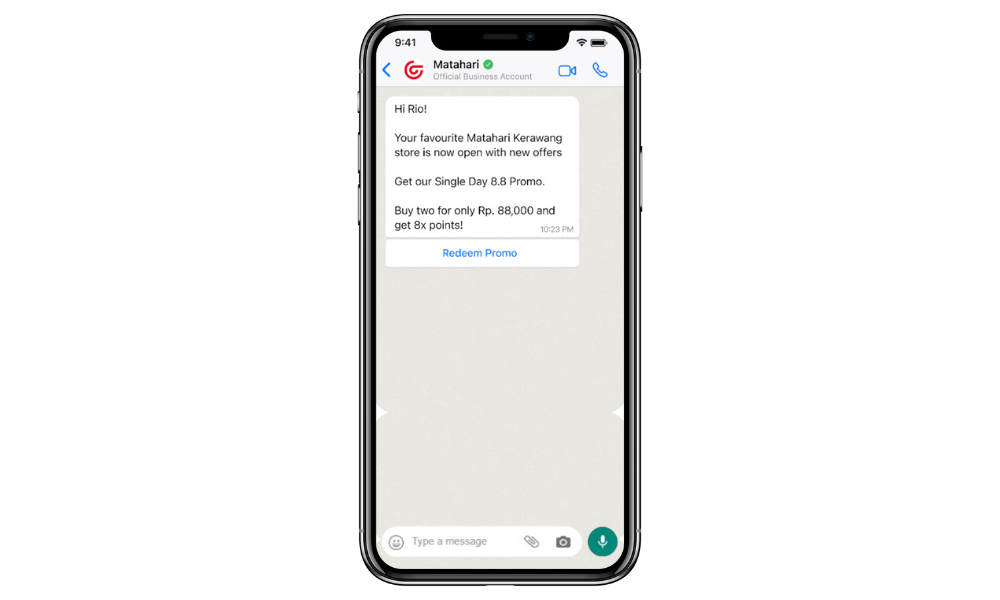
Leverage WhatsApp Channel for Marketing with Flowium
WhatsApp marketing has already established itself as essential for any firm looking to maintain a relationship with its clientele.
Successful organizations use WhatsApp automation as a tool to increase client engagement and enhance relationships. For our clients, Flowium can assist with developing an effective marketing strategy, creating top-notch promotions, and integrating your Klaviyo and WhatsApp Business accounts.
Contact us now, so you can quickly launch a WhatsApp campaign that sets you apart from the competition and begin to see results.
FAQ
Can I send bulk messages on WhatsApp?
The only permitted option to send bulk messages is using the WhatsApp API, which is not free and requires payment per message.
How do I set up a WhatsApp Business Account for marketing purposes?
Here’s a short instruction on how to set up WhatsApp Business for marketing:- Get the free app from the Apple App Store (iOS) or Google Play Store (Android), then install it by following the normal instructions.- You will need to sign up. This includes entering the international format of the phone number you wish to use for business.- Next, select your preferred method of communication to confirm this number: Call or SMS. You’ll receive a six-digit verification code.- Permit WhatsApp to access the contacts in your phone book.- Enter your business name, business category, profile image (typically your logo), and business address in the appropriate fields.- To better showcase your brand, you can now make a WhatsApp business profile that contacts may view. Business profile is where you do it.
How can I grow my WhatsApp subscriber list?
Adding people to your list is a continuous process. Keep track of which messages receive the best reaction, which channels generate the most sign-ups, and where users stray from the communication flow. To see what performs best, test various offers, creatives, or processes using this data.
What best practices should I follow to maintain a high-quality phone number rating on WhatsApp?
Before sending messages, always ensure that the opt-ins are safe. Users are more likely to trust your communications as a result. For less hassle, get your message templates pre-approved and make sure they adhere to all WhatsApp Business guidelines. Never send more messages than you have been given.
How can WhatsApp’s two-way messaging capabilities enhance customer engagement?
By enabling real-time communication between your company and customers, WhatsApp’s two-way messaging features can improve customer engagement. This implies that you can tailor interactions, respond promptly to questions or complaints, and foster audience loyalty and trust.

